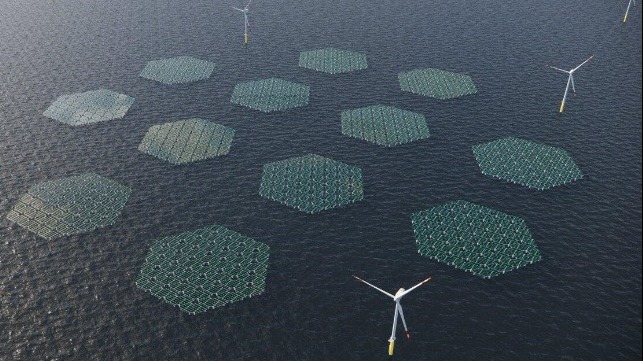Netherlands Awards Lease for Integrating Offshore Wind and Solar Power

The Netherlands announced the awarding of a new offshore lease for the first of two new wind farms which it believes represent the future of offshore energy generation. As part of the tender, the government required concepts that make better use of the full capacity. They called for new solutions for fully integrating all the electricity generated into the Dutch energy system while also maximizing the use of the area designated for the wind farm.
The winner of the permit for one of the two wind farms in the Hollandse Kust (west) Wind Farm Zone is Oranje Wind Power II, a subsidiary of Germany’s RWE. The site, which is located more than 30 miles off the coast in the North Sea, will be able to deliver more than 760 megawatts of offshore wind capacity according to RWE while also delivering solutions for the optimal integration of offshore wind farms into the Dutch energy system.
“To unlock full system integration the concept for HKW VII combines offshore wind with electrolyzer capacity for green hydrogen production, and other flexible demand solutions like e-boilers,” explains RWE. The government explains that any surplus electricity generated by the wind farm, such as when there are strong winds, will be used through these additions. The 600 MW of onshore electrolyzers will produce green hydrogen while there will also be 225 MW of e-boilers for district heating and industrial applications.
Two other unique elements to the new wind farm’s design are the addition of batteries and a floating offshore solar energy array. RWE partnered with a Norwegian start-up, SolarDuck, which will develop the first hybrid, offshore floating solar installation at a commercial scale. SolarDuck will build a 5MW demonstrator for the innovative integrated energy storage solution at HKW VII.
Koen Burgers, CEO of SolarDuck highlights that the concept of integrating floating solar with an offshore wind farm leverages the complementary elements between wind and solar as well as making better use of existing infrastructure and the ocean space. He believes this project will drive the growth of hybrid offshore floating solar projects.

that matters most
Get the latest maritime news delivered to your inbox daily.
The tender calls for the wind farm to be developed without a subsidy. It is due to become operational in 2026 contributing to meeting the Netherlands’ goal of 21 GW of offshore wind energy by 2030.
A second portion of the tender for the lease area to the north of HKW VII, known as HKW VI, is also currently under review by the government. RWE reports that it submitted “an innovative ecological concept to deliver a positive impact on biodiversity,” for that portion of the area. The government is promising to announce the results for that segment of the tender by December 15.
